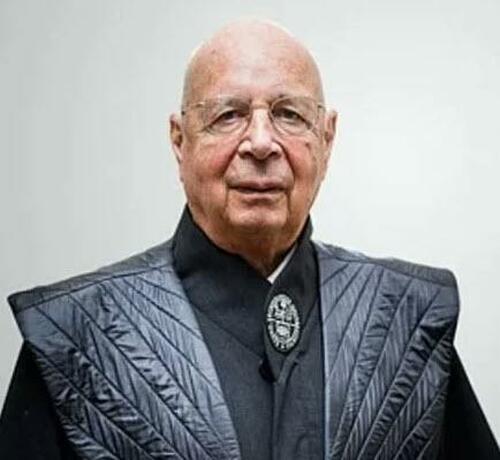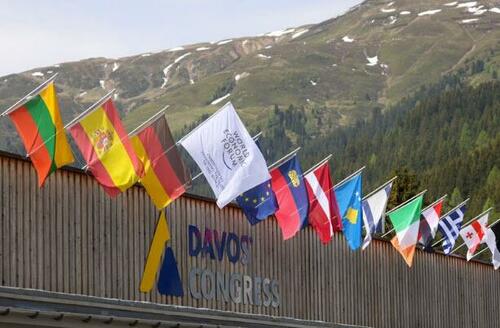The infamous World Economic Forum (WEF) will host its annual meeting in Davos this week, and Jordan Schachtel,via ‘The Dossier’ Substack, is going to make sure you know who is attending the invite-only gathering.
For those of you who are new to this nefarious organization:
The World Economic Forum (WEF), through its annual Davos conference, acts as the go-to policy and ideas shop for the ruling class. The NGO is led by a comic book villain-like character in Klaus Schwab, its megalomaniac president who articulates a truly insane, extremist political agenda for our future.
Heard one of your politicians declaring support for the “Build Back Better” agenda?
How about the “Great Reset?”
All of those bumper sticker political narratives were popularized by the World Economic Forum.
Have you read about the ESG (Environmental, Social, and Governance) movement?
That’s also a WEF favorite.
Davos 2022 includes the usual components of WEF’s “you’ll own nothing and you’ll be happy” totalitarian eco statist agenda. Topics discussed and panels at the 2022 meeting will include:
-
Experience the future of cooperation: The Global Collaboration Village
-
Staying on Course for Nature Action
-
Future-proofing Health Systems
-
Accelerating the Reskilling Revolution (for the “green transition”)
-
The ‘Net’ in Net Zero
-
The Future of Globalization
-
Unlocking Carbon Markets
-
And of course, a Special Address by Volodymyr Zelenskyy, President of Ukraine
The American contingent will include 25 politicians and Biden Administration officials. US Secretary of Commerce Gina Raimondo will join Climate Czar John Kerry as the White House representatives there. They will be joined by 12 democrat and 10 republican politicians, including 7 senators and two state governors
Without further delay, I’ve provided the entire list of attendees who are showing up to Davos next week. I’ll list the Americans below and the rest are linked below that in an attached document.
-
Gina Raimondo Secretary of Commerce of USA USA
-
John F. Kerry Special Presidential Envoy for Climate of the United States of America
-
Bill Keating Congressman from Massachusetts (D)
-
Daniel Meuser Congressman from Pennsylvania (R)
-
Madeleine Dean Congresswoman from Pennsylvania (D
-
Ted Lieu Congressman from California (D)
-
Ann Wagner Congresswoman from Missouri (R)
-
Christopher A. Coons Senator from Delaware (D)
-
Darrell Issa Congressman from California (R)
-
Dean Phillips Congressman from Minnesota (D)
-
Debra Fischer Senator from Nebraska (R)
-
Eric Holcomb Governor of Indiana (R)
-
Gregory W. Meeks Congressman from New York (D)
-
John W. Hickenlooper Senator from Colorado (D)
-
Larry Hogan Governor of Maryland (R)
-
Michael McCaul Congressman from Texas (R)
-
Pat Toomey Senator from Pennsylvania (R)
-
Patrick J. Leahy Senator from Vermont (D)
-
Robert Menendez Senator from New Jersey (D)
-
Roger F. Wicker Senator from Mississippi (R)
-
Seth Moulton Congressman from Massachusetts (D)
-
Sheldon Whitehouse Senator from Rhode Island (D)
-
Ted Deutch Congressman from Florida (D)
-
Francis Suarez Mayor of Miami (R)
-
Al Gore Vice-President of the United States (1993-2001) (D)
Full list of confirmed attendees of 2022 World Economic Forum Annual Meeting
Here’s the PDF File in case the link goes down.
There is one member of the ‘elites’ that is not going to be there (and never has).
As Mohamed El-Erian writes in an op-ed at Bloomberg, Davos meetings are full of potential but rarely full of solutions.
I have never taken up the opportunity to attend the Davos meeting and I will pass again this year.
That, however, does not mean that I do not follow its evolution and outcomes. I am certainly interested in what could emerge from a meeting that brings together so many leaders of governments, civil society and business.
In an ideal world, this year’s meeting would prove catalytic in two important ways.
-
First, it would trigger greater awareness of ongoing watershed developments in the global economy and draw attention to how differently these are viewed around the world.
-
And second, it would point to ways in which an increasingly “zero-sum” view of international coordination can be reshaped to contribute to collective resilience and inclusive prosperity.
The list of ongoing watershed developments in the global economy is long, extending well beyond the horrific war in Ukraine and the associated human tragedies. Here is an example of what is on such a list:
-
Due to the convergence of food, energy, debt and growth crises, a growing number of poorer countries face a rising threat of famine — and this is but one part of the “little fires everywhere” phenomenon undermining lives and livelihoods around the world.
-
Inflation at 40-year highs in wealthier countries is undermining standards of living and growth engines, hitting the poor particularly hard, fueling political anger, eroding institutional credibility, and undermining the effectiveness of economic and financial policy.
-
The inability to deal with critical secular challenges, including climate change, is seeing short-term distractions compound what already are meaningful long-term challenges.
-
Private- and public-sector efforts to strike a better balance between highly interconnected supply chains and national/corporate resilience are complicated by a global economy that lacks sufficient momentum for this to be done in an orderly fashion.
-
The western weaponization of international finance, while effective in bringing the eleventh largest economy in the world to its knees, has been pursued without a global framework of standards, guidelines and safeguards.
I suspect that, while the vast majority of Davos participants will agree on this list (and, indeed, add a few more items), there will be quite a bit of disagreement on the causes and longer-term consequences. Such disagreement is problematic in two ways.
-
First, it undermines the shared responsibility needed to address challenges with important international dimensions;
-
and second, it erodes even more trust in the existing international order. Unless the disagreements can be resolved, the damaging effects will deepen and spread.
On paper, the upcoming Davos meeting would be perfectly suited for resolving these conflicts. History, however, does not provide much encouragement or optimism.
Time and time again, Davos has fallen victim to a lack of focus and actionable unifying vision. Individual and collective interests have remained unreconciled. Distractions abound. As a result, the output has been, at best, backward-leaning.
Given the multiple crossroads facing the global economy, this would be a particularly good time for Davos to fulfill its considerable potential — to look ahead, not back. To identify solutions instead of just problems. Otherwise, the forum will evolve even more into a network and social club that is, and is widely perceived to be, even more decoupled from the realities of many and the challenges of most.


